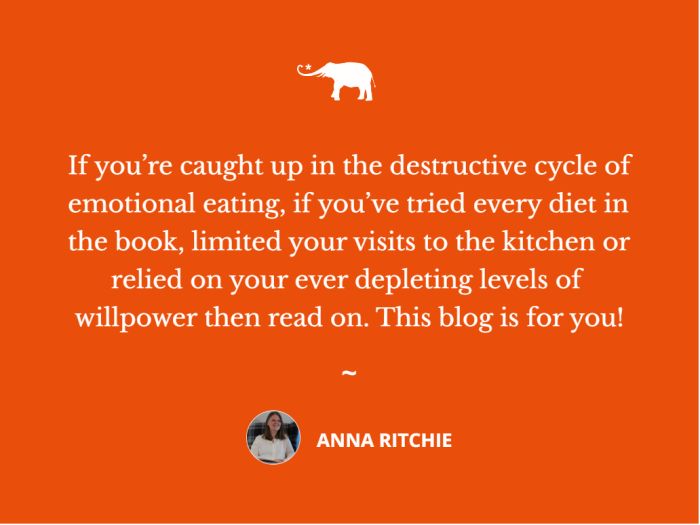Food! You can’t live with it, you can’t live without it. For an emotional eater, hunger and habit become one and the same, driven by a mix of difficult life challenges, overwhelming emotions and the pull of sugary, high-fat, processed foods, aka comfort foods.
If you’re caught up in the destructive cycle of emotional eating, if you’ve tried every diet in the book, limited your visits to the kitchen or relied on your ever depleting levels of willpower then read on. This blog is for you!
My name is Anna Ritchie and I’m a Clinical Hypnotherapist who specialises in helping women break the habit of emotional eating.
In this blog, I’m going to take you through my 3 Cs to help you take the emotion out of eating. Look forward to bringing calm, clarity and care to your eating habits so you can begin to eat mindfully and meet your emotional needs appropriately and compassionately.
What Is Emotional Eating?
Emotional eating is when we eat to feel better and not because we’re hungry. It is generally triggered by stress and is, more often than not, a learned behaviour rooted in childhood.
Many emotional eaters report seeing dysfunctional eating habits from a parent and many emotional eaters pinpoint a particular time in their childhood when they realised that comfort foods helped them to feel better (momentarily, I must add).
For others, food encapsulates happy childhood times of love and warmth and, as adults, these emotional eaters attempt to recreate these feelings using food as the main source of comfort, particularly in times of stress and unhappiness.
Here are some common signs of emotional eating:
- Eating when you’re stressed
- Experiencing sudden cravings
- Finding it hard to stop eating once you’ve started
- Eating beyond feelings of fullness
- Feeling out of control around food
- Eating to feel happy
How to Stop Emotional Eating?
Emotional eating is complex and is made up of many strands, all of which need to be unravelled and understood. My programme, Your Weight in Mind, tackles the main factors that underpin emotional eating to help you achieve quick and long lasting results.
In the meantime, there are some strong, positive habits that, with practice, you can put in place so you can stop that chain reaction of reaching for food when you need comfort.
Carry on reading to find out how my 3 Cs to Stop Emotional Eating can help you take the emotion out of eating and respond to your needs in healthier and more compassionate ways.
C#1: Calm
This section will take you through the journey from emotional chaos to emotional calm. Having this background knowledge will help you recognise the signs of stress so you can take positive action and create emotional distance between you and food.
What is the (negative) emotional state?
Picture this. You’re cooking, you take your gaze off the boiling water in the saucepan for a split second and before you know it, you hear that dreaded hissing and sizzling as the water uncontrollably boils over.
This scenario isn’t dissimilar to your emotions when they become charged (or heated up). Perhaps you’ve been simmering for a while and your emotions have been heating up gradually or perhaps the heat has simply been turned up too high and too quickly. Whatever the case, when your emotions rise, they start to boil. You move away from the cool, calm and controlled state to the hot, bubbling and out of control state.
What actually happens when we’re stressed?
Rising emotions trigger our innate stress response which causes a release of stress hormones into the bloodstream. This results in a series of physiological changes that we experience as symptoms such as racing thoughts, rapid breathing, tense muscles and sweating to name but a few.
But more importantly, however, we also lose the connection to the logical part of our brain and therefore lose our ability to find solutions (in survival mode, we don’t have time to think rationally which is why we’ve evolved to react to threats instinctively). As stated previously, we become that hot, bubbling and out of control water in the pan.
We lose the connection to the logical part of our brain and therefore lose our ability to find solutions.
Anna Ritchie
And let’s not forget, this is the time of high emotions when you have, up until now, felt that irresistible pull towards comfort foods. The feelings are all-encompassing. Your thoughts are overwhelmingly focused on food, your cravings for comfort foods are off the scale, your mouth is watering as you imagine the relief when you take that first bite and you feel completely out of control. At this point, nothing else matters except food.
Why will relaxation help?
Let’s go back to the saucepan scenario above.
When the water begins to boil and bubble uncontrollably over the pan, what do you instinctively do? Of course, you turn down the heat. And this is exactly what you need to do, metaphorically speaking, when you’re feeling emotionally overwhelmed (and about to raid the kitchen cupboard).
Relaxation is the equivalent of turning down the heat. As you begin to breathe more slowly and deeply, you will trigger a reaction in the body that short-circuits your stress response and brings about a calmer state in both your body and mind.
From this calmer state, you can then start to take stock of the situation and make choices from a place of mental clarity and logic.
By taking the time to focus on relaxation in that moment when your cravings feel overwhelming, you’re not only starting to break the cycle of emotional eating, you’re giving yourself the opportunity to calm down and really understand what’s driving your unwanted eating habit.
How can I relax?
In my hypnotherapy practice, I equip clients with powerful ways in which to relax and manage tricky emotions but, you can still practise deep breathing and enjoy some great results. Below are two highly effective ways of using deep, abdominal breathing to bring about a relaxed state of calm.
7/11 Breathing TechniqueSquare Breathing Technique
- Exhale and release all the air from your lungs.
- Take a gentle in-breath and count slowly to 4 as you do so.
- Hold at the top of your breath for 4 slow counts.
- Gently breathe out through your mouth as you count slowly to 4.
- Hold at the bottom of your breath for 4 slow counts.
Why not add an affirmation for even better results?
If you’d like to go one step further and reap even more benefits from this relaxed state, add a positive affirmation such as “I’m safe, calm and relaxed.” You might like to try writing your own affirmations by checking out MindTools for detailed help and guidance.
It’s thought that the optimal time to say affirmations is as soon as we wake up in the morning or just before we go to sleep. This is because our brain waves slow down and our conscious mind becomes less active as the subconscious mind takes over.
Similarly, once you have relaxed, perhaps by using one of the relaxation suggestions above, you will be in a much more receptive state to absorb the meaning of the affirmation.
C#2: Clarity
Why is clarity of mind so important?
One of my favourite sayings is “awareness is the key to change.” I’m sure you’ll agree that if we don’t know what we’re dealing with, we can’t do anything about it!
Being in a calm and logical mindspace gives you the freedom to understand what is going on for you in that moment. After you’ve turned down the heat on those bubbling emotions, you’ve moved away from that turbulent inner state which means you will now be able to see your situation with more clarity and logic.
But what exactly do you need to get clarity on?
Firstly, it’s about recognising what’s going on for you in that moment when you’re feeling compelled to comfort eat.
- What are you feeling?
- When did the feeling start?
- What was happening when the feeling started?
Secondly, ask yourself what it is you really need. If you could wave a magic wand to make this situation better, what would have to happen to give you the resolution you need?
For further clarity, you might like to ask yourself:
- What does that need look like?
- What does that need sound like?
- What does that need feel like?
Thirdly, it’s about having the space within your thoughts to acknowledge any difficult feelings without judgement. Emotions ebb and flow. Yes, they can feel incredibly uncomfortable but it’s important to remember that the feelings will pass. It’s in these times I like to say “even though I’m feeling [insert negative emotion] I’m doing the best I can.”
If you’re interested in finding out more about what triggers your eating habits and what sort of eater you are, check out my free Emotional Eating Clarity & Care Kit today by clicking here now.
C#3: Care
How can you meet your needs?
At this stage, you’ve relaxed and moved into a place of calm, and you’ve got clarity about your current situation. You understand what’s triggered your emotional eating and you are much clearer about what you really need.
This final C is therefore about meeting that need appropriately and treating yourself with the care you need and deserve.
Now, it could be that you might have some hang-ups about self-care. If you’ve grown up with the belief that putting your own needs before those around you is selfish then the idea of self-care can bring about feelings of resistance. Or perhaps you feel as though you don’t deserve to be treated with care. Although this is a common trait of emotional eaters, the fact that you’re seeking comfort albeit from food shows that there is a part of you that’s trying to be helpful even if it is misguided.
If you experience any resistance, that’s ok. Be kind to yourself and just take one step at a time.
But whatever your belief about self-care is, by practising self-care on a regular basis, you’re not only building a habit that will become stronger and stronger, you’re also building a more loving connection with yourself.
Below are some ideas for self-care. You might also like to grab my free Emotional Eating Clarity & Care Kit today which includes a relaxing mindfulness meditation so you can allow any difficult thoughts to pass easily and without judgement. Simply click here for instant access now.
The truly exciting thing about making these psychologically sound changes is that when you start to treat yourself with self-care, you will naturally and instinctively begin to make food choices that are right for you.
And so there you have it! The 3 Cs to help you stop emotional eating.
You’ve learnt how to calm your mind with two powerful relaxation techniques, you’ve moved into a place of inner clarity and logic so you can understand what you really need when the compulsion to eat is overwhelming and, you know to meet that need with care and compassion.
Now you can approach your eating habits positively and finally take the emotion out of eating.
Grab your FREE Emotional Eating Clarity & Care Kit and start to take control of your eating habits today! Just click the button below for instant access.
I offer high-end hypnotherapy and coaching via my successful flagship programme, Your Weight in Mind, which helps women break the destructive habit of emotional eating. Click here now to find out how I can help you.
LinksRelaxation
Deep Breathing
https://rightasrain.uwmedicine.org/mind/stress/why-deep-breathing-makes-you-feel-so-chill
https://my.clevelandclinic.org/health/articles/9445-diaphragmatic-breathing
Affirmations
https://www.bettersleep.com/blog/bedtime-affirmations/#:~:text=One%20of%20the%20best%20times,’stick’%20and%20take%20effect.
https://www.mindtools.com/pages/article/affirmations.htm
Brain Waves
https://www.healthline.com/health/theta-waves
Stress Response
https://www.health.harvard.edu/staying-healthy/understanding-the-stress-response







Read 0 comments and reply